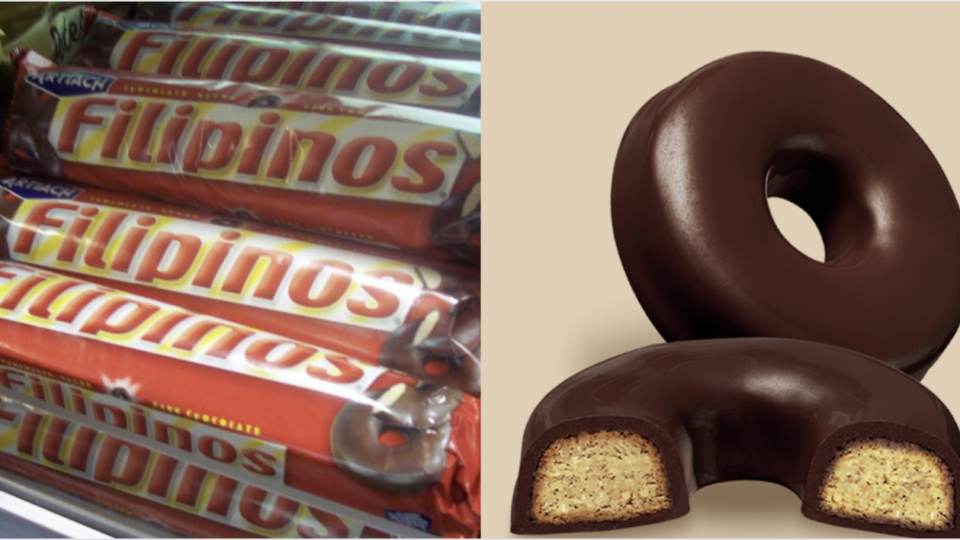Leave it to Reddit to unearth obscure facts that have largely been forgotten, such as the existence of a popular brand of chocolate snacks from Spain called Filipinos.
“Anyone else tried this snack? Bought it on a Renfe train en route from Madrid to Sevilla. Wiki says it has been sold for 40+ years but [it’s my] first time seeing it,” user u/ChargeOk7637 asked in the r/Philippines subreddit recently.
While it may come as a shock to some that a snack brand from the other side of the world bears our name as a people, it isn’t news to us. And yes, despite our culture’s general obsession with Pinoy Pride, the existence of the Spanish Filipinos biscuits has actually sparked outrage in the Philippines several times over the past few decades.
WTF is Filipinos?
Filipinos is a brand of biscuit doughnut snacks sold in Spain, France and Portugal, as well as Nordic countries, under the Artiach brand name. Artiach, which was founded in 1907, refers to itself as “Master Biscuit Makers” and claims to be one of the oldest biscuit companies in Europe.
Usually wrapped in shiny foil with the name figuring starkly on the cover, each Filipino‘s package contains a number of round, ring-shaped, light-colored biscuits that are soft in texture and coated in chocolate (hence the outrage — but we’ll get to that later). Based on the Artiach website, Filipinos currently come in five varieties: milk chocolate, white chocolate, black chocolate, caramel, and berries.
The biscuits are said to resemble the Philippine delicacy rosquillos (ringlets in Spanish), which are sweet, ring-shaped cookies that originated in Cebu. This is one of the possible theories for why they’re called Filipinos (as veteran foodie Market Man writes, “Perhaps a rosquillo being brought to Spain that accidentally fell into a cooling vat of chocolate?”)
But Artiach is mum on the actual origin story for the snacks — leaving a lot of room for interpretation among those who take offense at its name.
‘Dark outside, white inside’: a brief history
The Filipino people’s contentious history with Filipinos the snack spans over 20 years. It began when Heherson Alvarez, then-Isabela’s 4th district congressman, filed a House Resolution urging the Department of Foreign Affairs to file a diplomatic protest against the government of Spain, the Spanish Foreign Ministry, and its then-manufacturer, Nabisco Iberia, over the brand name and to demand that the manufacturer stop selling the cookies until the name is changed.
Alvarez claimed that the biscuit was named Filipinos in reference to the cookies’ color and coating — dark on the outside, white inside.
Whether Alvarez’s claim is a reach is debatable. Still, it does beg some questions as to why a Spanish manufacturer would choose to name a biscuit after a former colony their country once occupied for over 300 years.
“These food items could be appropriately called by any other label, but the manufacturers have chosen our racial identity, and they are now making money out of these food items,” Alvarez’s resolution read.
The resolution was met with initial reluctance by Foreign Affairs Secretary Domingo Siazon, who said that he saw nothing wrong with using Filipinos as a brand name, arguing that the Austrians don’t complain that small sausages are called Vienna sausages.
Yet Siazon seemed to change his tune not long after when then-President Joseph Estrada called the biscuits “an insult to Filipinos,” and his department’s budget was set to be deliberated on by Congress. Eventually, his department filed the protest.
2019: The cookie controversy returns
After the brouhaha, the issue apparently ran its course with no clear resolution. But 20 years later, the Filipinos issue would resurface after a membership-only grocery store in Manila reportedly started carrying the biscuits across its branches.
Department of Trade and Industry secretary Ramon Lopez said that not only did the brand’s name have racist undertones, the product was a clear violation of a Philippine trademark law that prohibits using the name of a country or a nationality as a brand.
“But since it is from Spain and perhaps if that was being sold in Spain and in other places and they don’t have that kind of law, they are free to do so but once it enters the Philippine market, we should be prohibiting those,” Lopez told GMA’s 24 Oras.
Lopez also said that the label description, which reads “chocolate negro” (which means dark chocolate in Spanish), could spark a cultural issue.
“Somebody has to file a complaint. It could be from our cultural commission or Philippine historical commission if they want to file a protest once they read this ‘chocolate negro.’ What are they trying to imply? It connotes another thing. So that could be a potential issue,” he said.
While the grocery store has quietly removed Filipinos from its shelves since, this hasn’t prevented Filipinos’ interests from getting piqued, with the few who can travel to Spain or other countries where they are sold trying it every chance they get.
And although we can argue about whether the name Filipinos was meant to be derogatory, it seems a bit extreme getting riled up over a cookie, doesn’t it?




